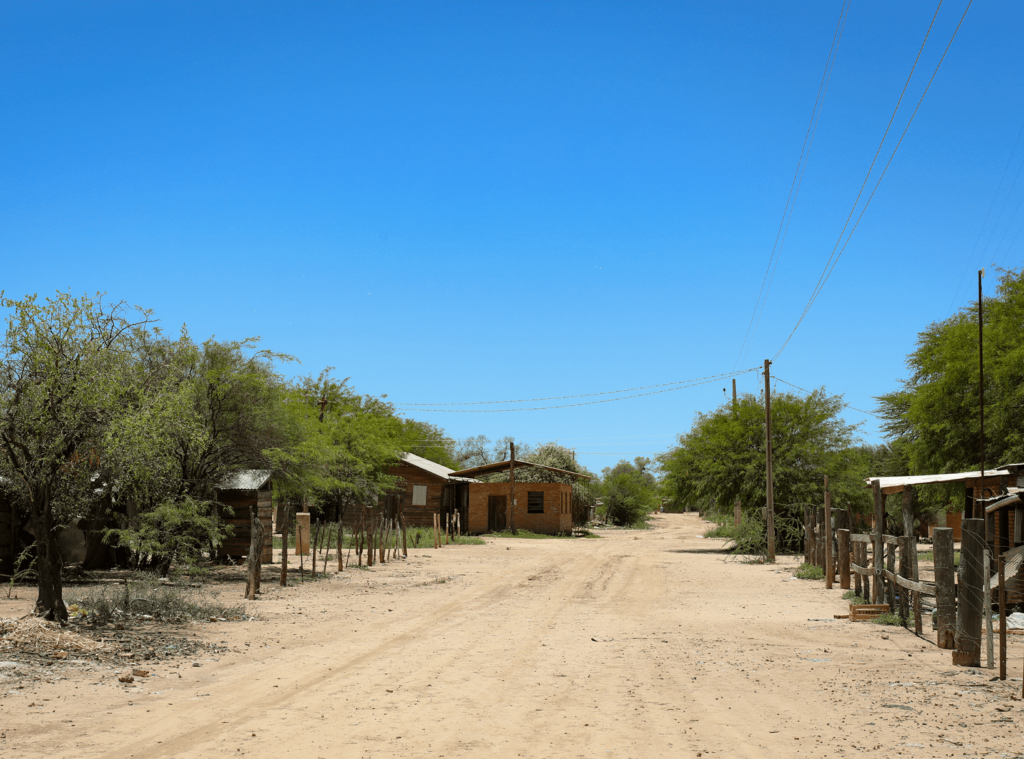
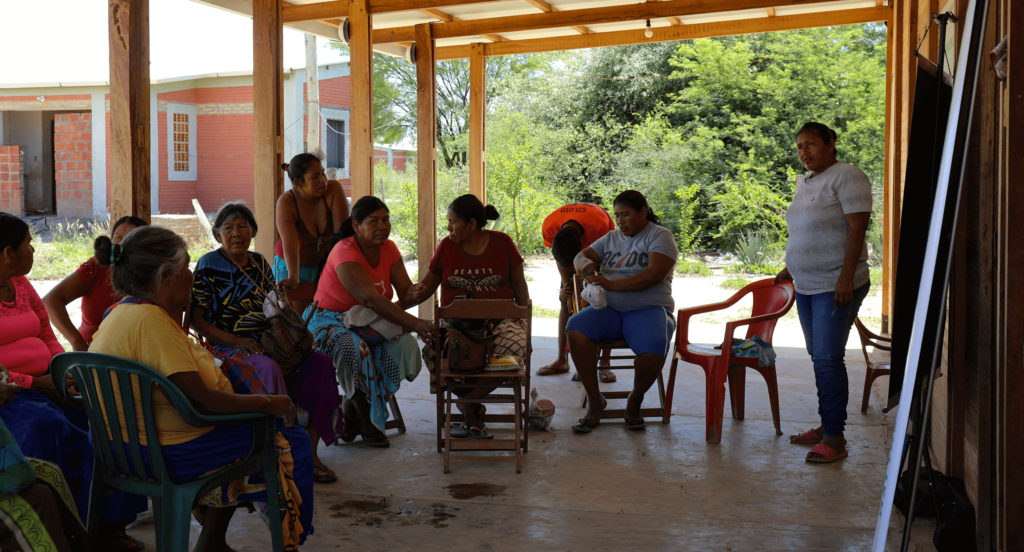
In the area of Campo Loro she meets with the Organization of Women Artisans; in Macharety, with the Guarani Nivacle Ayoreo colleagues, and in the community of Santa Teresa, with the Kuña Guarani Katupiry Women's Commission. She also visits the area of Nasuuc, where there is still no Indigenous Women's Organization, but Angelina goes there to encourage its creation: "You can meet and see what you need, what you require," she says in front of an assembly.
The women look at her and, with the help of the community's teacher-translator, they are encouraged to share some of their needs and challenges..
In the shade of a tree to protect herself from the sun, Angelina says that the work in Nasuuc is just beginning, but she is optimistic that they will achieve something because the seed has been planted.
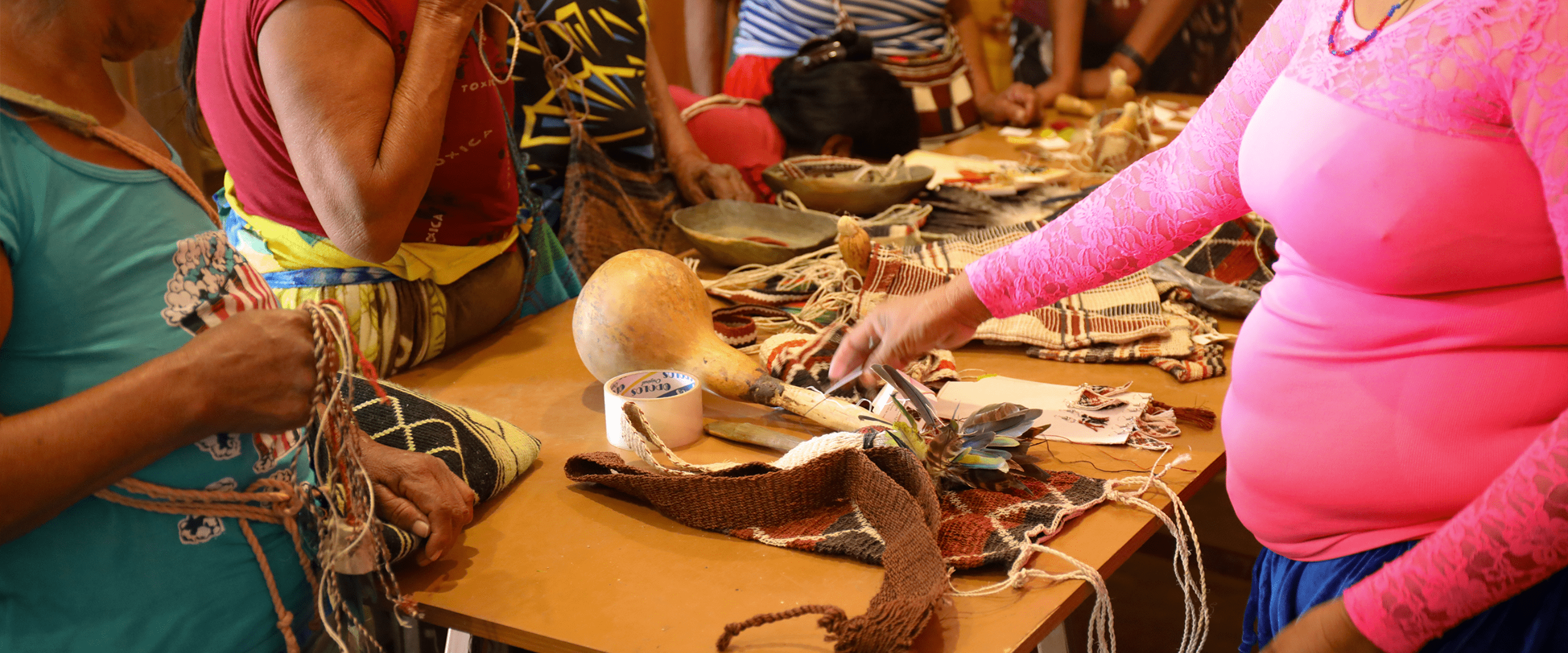
She says that when she applied to IIWF's Ayni Fund, she never imagined she would get it. Nevertheless, she applied. Some time later, she received an email confirming that she had obtained the technical and financial support. She immediately went to the nearest village to gather the requirements, including opening a bank account. When she informed her fellow Guarani leaders, mostly men, they were surprised and even incredulous. But Angelina persevered, inspired by the legacy of leadership she had received from her mother, who was a leader in her community and co-founder of the Macharety Foundation. Angelina gathered the necessary documents and received the support, surprising everyone.
The funds were used to organize meetings with women from different Guarani communities, some from Bolivia and others from neighboring communities far from Macharety, where Angelina lives. However, what no one around the world imagined was that a pandemic would arrive, locking up everyone in their homes. Face-to-face meetings were not allowed for a while, which also affected the communities Angelina works with.
Faced with this situation, Angelina resumed her leadership and focused her support on measures to mitigate the effects of the drought, such as the installation of plumbing, the construction of a water cistern and the supply of water in her communities. Despite the benefits, some of her male colleagues objected, but Angelina responded, "We are in this together, we are not going alone. We are all going at the same time”. Adriano's van travels a winding road through a mixed terrain of mud and fine soil that stirs up dust as it passes. Angelina comments that it has rained miraculously in the last few days, although not as much as before or in the quantity they need. The van pulls onto a road where coal trucks are fellow travelers.

At the same time, and for some years, drought had been taking over the landscape of El Chaco due to the climate crisis affecting the region.
According to various sources, rainfall levels have decreased significantly in the last decades, which has generated serious water shortage problems in the Indigenous Communities.
Faced with this situation, Angelina resumed her leadership and focused her support on measures to mitigate the effects of the drought, such as the installation of plumbing, the construction of a water cistern and the supply of water in her communities. Despite the benefits, some of her male colleagues objected, but Angelina responded,
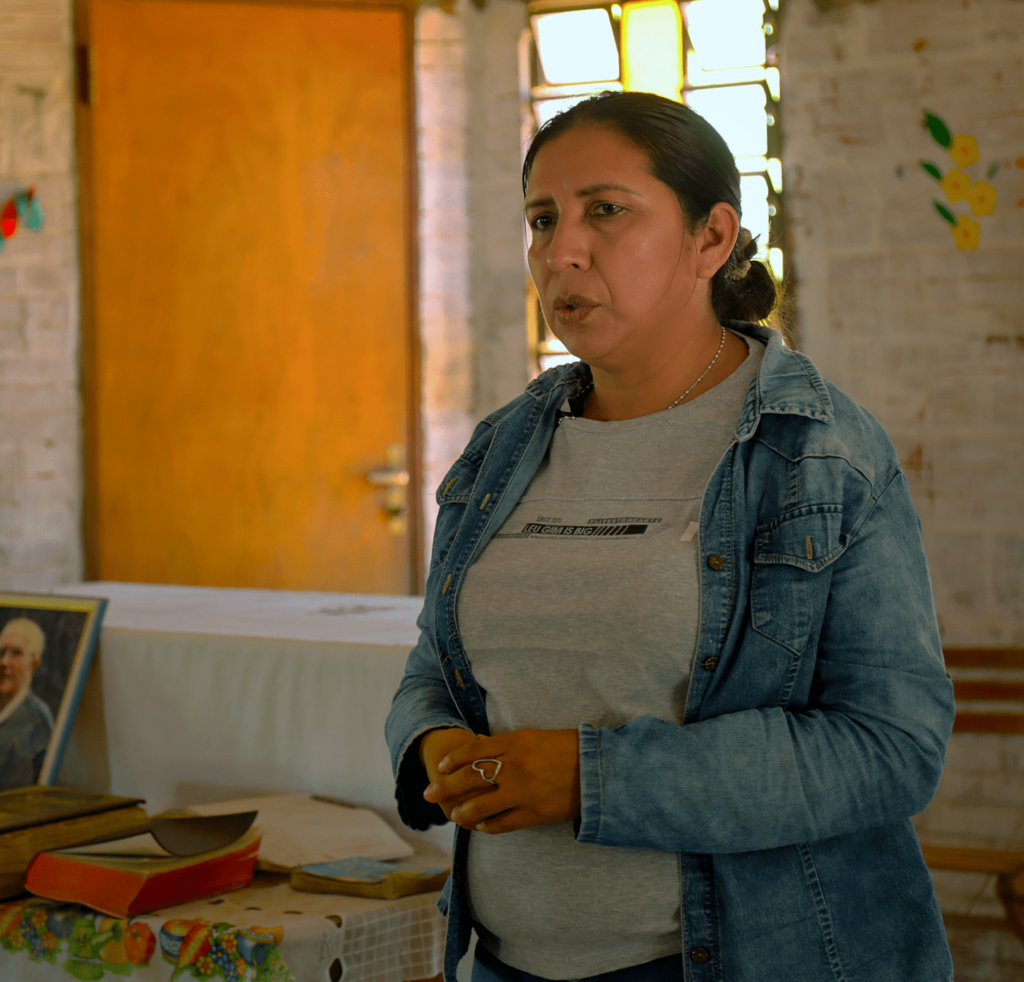
“We are in this together, we are not going alone. We are all going at the same time”
Adriano's van travels a winding road through a mixed terrain of mud and fine soil that stirs up dust as it passes. Angelina comments that it has rained miraculously in the last few days, although not as much as before or in the quantity they need. The van pulls onto a road where coal trucks are fellow travelers.
According to various sources, rainfall levels have decreased significantly in the last decades, which has generated serious water shortage problems in the Indigenous Communities. Faced with this situation, Angelina resumed her leadership and focused her support on measures to mitigate the effects of the drought, such as the installation of plumbing, the construction of a water cistern and the supply of water in her communities. Despite the benefits, some of her male colleagues objected, but Angelina responded, "We are in this together, we are not going alone. We are all going at the same time”. Adriano's van travels a winding road through a mixed terrain of mud and fine soil that stirs up dust as it passes. Angelina comments that it has rained miraculously in the last few days, although not as much as before or in the quantity they need. The van pulls onto a road where coal trucks are fellow travelers.
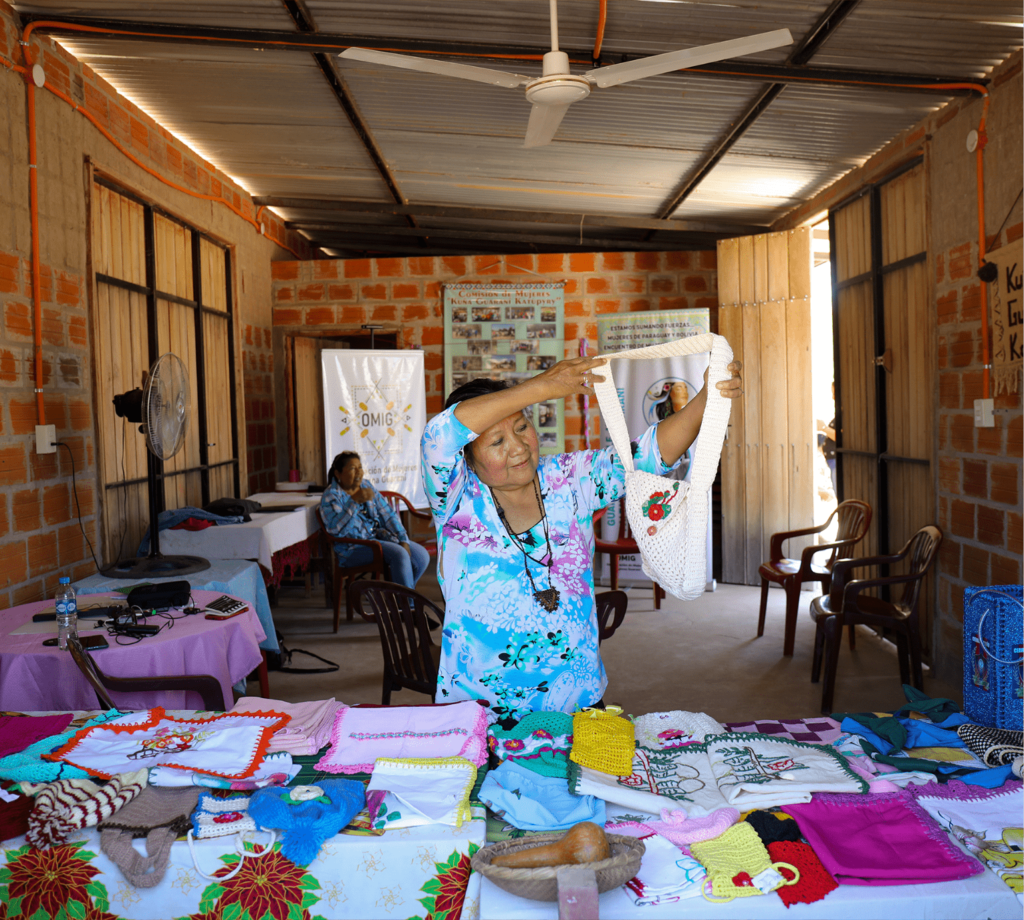
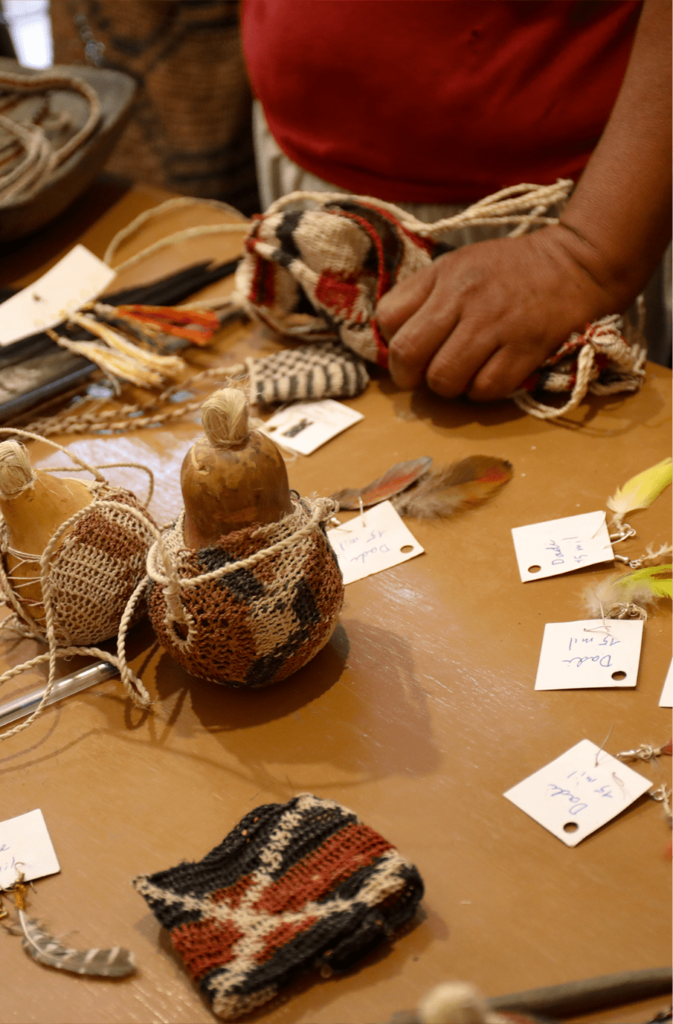
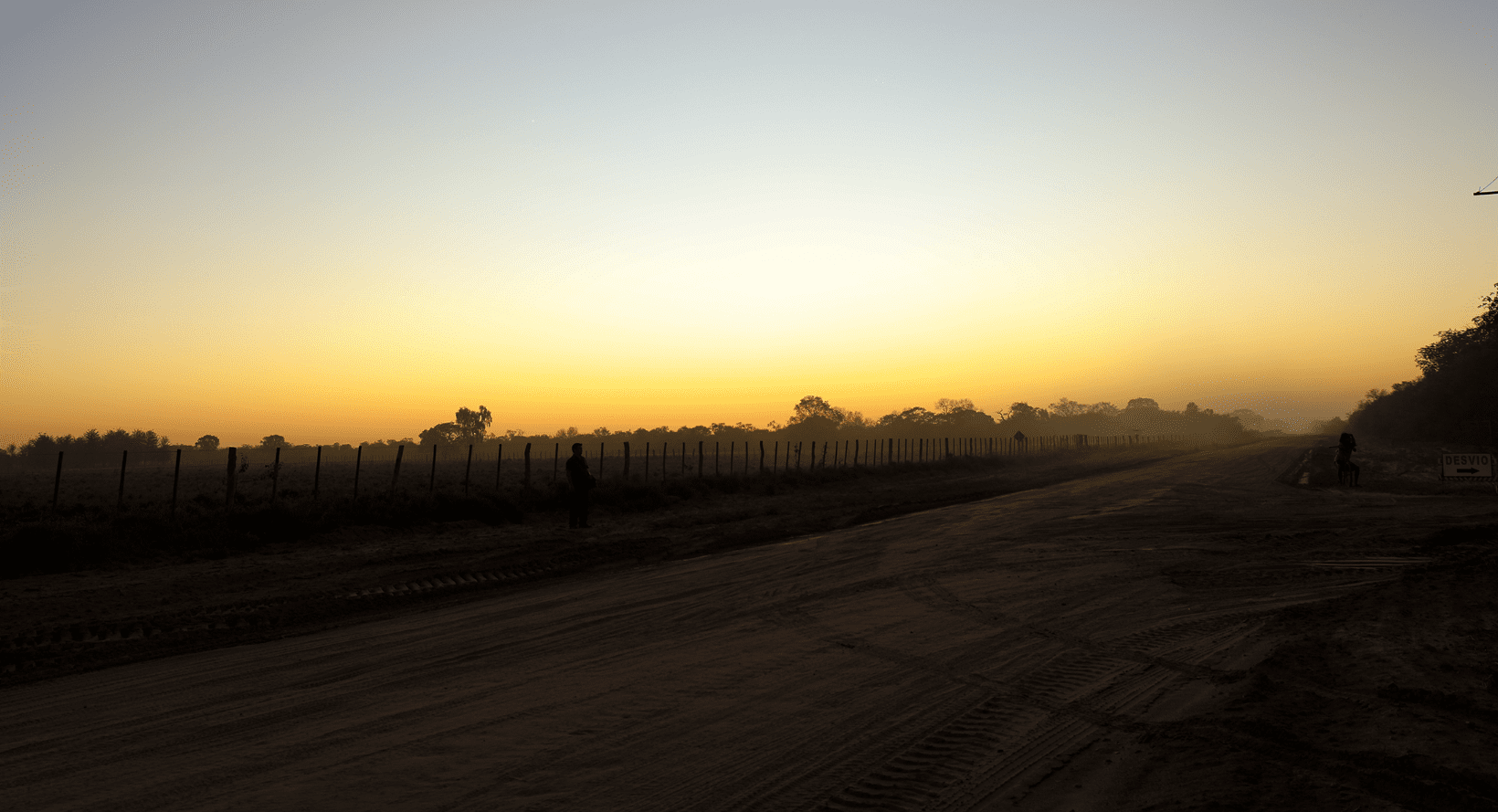
Through the window, the landscape of the Chaco can be seen: a vast Paraguayan savanna under a bright sun, with birds nesting on electricity pylons and some peculiar trees. At first glance, they may look deformed, but Angelina explains their common name: palo borracho. They are trees that look like they have indigestion, with a protuberance bulging from their trunk at the height where they could have a stomach. This deduction is not far from the truth, as due to the high salt load in the soil, the trees, which are actually ceiba trees, swell up and their trunk shows strange shapes.
WE ARE IN THIS TOGETHER, WE ARE NOT GOING ALONE.
WE ARE ALL GOING AT THE SAME TIME
IIWF is a global mechanism that works with Indigenous Women and Indigenous Women’s Organizations from all 7 regions of the world, with an impact that spans local, regional, and international.

At IIWF, we believe that local and global actions are interconnected, and this is evident in the work of Angelina and her organization in the fight against climate change and its adaptation
It is important that Indigenous Women and organizations recognize the challenges they face in applying to different IIWF programs, where they can strengthen skills that allow them to connect on an international level, but with the end result of creating change in their own communities.
Thus, it is like planting a seed, which has the potential to grow like a ceiba tree in the middle of a savanna landscape. The palo borracho is a visual metaphor for what the women of the Chaco communities are achieving. A tree of change, with winding paths and thorns, but resistant to extreme climates. This is the path faced by the women of the communities, with droughts and doubts from their peers, but in the end they emerge transforming the landscape and giving identity to the territory.
Teka-Pora
means good living for the whole community, for the women who belong to it. To be able to do something, even small things,
explains Angelina under another tree, sitting on a wooden chair in the shade
This Guaraní word stands for the common good and good living for all. Angelina travels through the communities of Campo Loro, Macherety, Santa Teresa and Nasuuc, seeking to achieve a Teka-Pora for her companions and for all those who live there. She has already begun her work, she is the seed, it only remains to wait and see how far her efforts grow.
